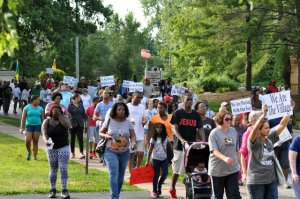I can’t imagine killing another human being. Can you?
I can imagine the circumstances where I might do so, if it was kill or be killed. But I don’t want to dwell on the details.
Research has shown that soldiers have to be trained to kill, otherwise they shoot to maim rather than to kill. The deep instinct of a human being is not to kill another human being.
So how did we get to a situation where, almost every week it seems, another young Black man gets shot by a police officer in the USA? How did we get to a situation of Israelis slaughtering Palestinians in Gaza, war in Syria, ISIL murdering Yezidis and Christians?
I believe that the answer is that the killers must be trained to see their victims as not human. They see them as other, as being of less worth than a person of the same ethnic group or the same religion as themselves. We can see this in white supremacist ideology and in the deadly rhetoric about the Palestinians, the Yezidis, and Christians in the Middle East.
The situation with the Palestinians, the Yezidis, and Ferguson, Missouri are all linked in my mind – not just because they were all happening at the same time, but because the root cause of all three situations seems quite similar: two distinct groups (ethnic and/or religious) occupying the same space, one of them more powerful than the other, and desiring the elimination or subjugation of the other.
I am not arguing for assimilation of one group into another – assimilation is just as violent and destructive as elimination (look at the effects of such policies on Australian Aborigines and First Nations peoples). I am saying that we need to respect and value diversity as a healthy way for a community to be.
There are many processes by which one group comes to regard another group as “not human”. One of these is the alienation produced by capitalism, in which we are divided from ourselves, divided from the work of our hands, separated from Nature, and separated from each other. Instead of seeing other people as people, capitalism sees them as commodities, resources, units of work and cost.
But the practice of othering is far older than capitalism. Look at the mass slaughter of the Crusades, the persecution of heretics and alleged witches, the pogroms against the Jews throughout medieval Europe. In each of these, the targeted group was seen as less than human. There was even a medieval legend that Jews had tails. Jews were made to dress differently so as to be easily identifiable, and to live in separate enclaves (ghettos and shtetls). They were only allowed to work at certain occupations, such as moneylending.
Now compare these with the systemic racism against Black people. Black people are regarded as other; they are discriminated against in employment and education; they are treated as potential criminals wherever they go; their hairstyles referred to as “unkempt”. It is only a generation or two since the end of segregation in the United States. But the attitudes that gave rise to segregation are still widespread.
Combine that with routinely giving guns to the police, and the authoritarian and white supremacist attitudes of many police officers, and it is hardly surprising that so many Black men and women are getting killed, just for “walking while Black”. Even in the United Kingdom, where access to guns for the general population is far more restricted and the police do not routinely carry guns, more Black and minority ethnic people get arrested or stopped and searched than white people. And there are still shootings of Black and minority ethnic people: Mark Duggan, Jean Charles de Menezes.
Many white people seemingly cannot understand the legitimate anger and frustration of Black people. Try to imagine being afraid just to walk down the street, in case you get arrested and killed. Try to imagine being afraid just to send your son to school, in case his walking out the door in the morning is the last time you see him alive. Try to imagine being turned down for employment just because of the colour of your skin. Try to imagine people asking where you’re from, and not accepting the answer of a place in the same country, because you must be from somewhere else, right? Try to imagine being someone’s token Black friend. Read about the experiences of Black people in being confronted with systemic racism, ingrained in the very institutions that we take for granted will treat us as equals (unless we are female or LGBT, but that’s a different blogpost).
This is a quote from Pam Duggan, Mark Duggan’s mother:
Mark was a peacemaker. He had a soft heart and he loved life. I have to be strong for the sake of Mark’s children, my grandchildren, and the rest of my family. But my life has changed so much since the police shot Mark. Sometimes I’m scared to go out. And if I see a police car driving down the street my whole body starts to shake. I think that the officer who killed Mark could be in that car or that they’ve got guns and might do to someone else what they did to Mark.
A Huffington Post article compared the scenes in Ferguson with the street battles of the Civil Rights era. The only difference was that the Ferguson photos were in colour and the police were more heavily armed.
Even middle-class Black people are not immune: look what happened to Charles Belk and Henry Louis Gates. And it is not just Black men who are targeted: many Black women have also been killed by police.
Recently I posted some UK government statistics on my Facebook wall, comparing the numbers of arrests and convictions of Black and minority ethnic people in Britain, and asked whether people thought that they represented racism in the justice system. One person shared the following anecdote:
A doctor driving a blood sample to the lab late at night, in his own car. Stopped by the police, who want to give him a breathalyser test, check his licence, and want to know what’s in the bottle. They give him a very hard time while he repeatedly tells them: he’s a doctor, he works *here*, he’s driving the blood to *here*, yes, this is his car, no, he is sober, he is on call, he doesn’t drink when on call…. Eventually a phone call from the lab wanting to know where the blood sample was convinces the police he really is who he says he is, and they let him go suspiciously. White lab staff find this bewildering and inexplicable, they’ve never heard of the police bothering doctors on call before. Black doctor doesn’t, and notes that this is why he wears a respectable suit-and-tie at all times when driving his expensive car.
That is institutional racism. The assumption that a Black person is more likely to be a criminal, that the expensive car they are driving must be stolen, that they are involved in a gang, or shoplifting, or that they have a gun or a knife.
The Macpherson Report defines institutional racism as:
The collective failure of an organisation to provide an appropriate and professional service to people because of their colour, culture, or ethnic origin. It can be seen or detected in processes, attitudes and behaviour which amount to discrimination through unwitting prejudice, ignorance, thoughtlessness and racist stereotyping which disadvantage minority ethnic people.
Systemic racism is a similar concept to institutional racism, but it occurs when the way a society is structured systematically ends up giving advantages to some and disadvantages to others. Individual racists are a problem, but it is when the system gives them a free pass to act out their violent supremacist views that we have a systemic problem. Consider the difference in response to the Ferguson protests and the Bundy protests. Benjamin Corey writes:
The piece that completely tipped the scale for me was this piece which illustrates the response to protestors in Ferguson compared to protesters at the Bundy Ranch. At the Bundy Ranch, armed whites confronted the government to stand along side a rancher who’s been stealing from the government. They went as far as having weapons drawn on the police– and the response? The government backed down.
Compare that to Ferguson, where protesters have been met with police who were more armed up than the folks I served next to in Operation Allied Force (and I’m not even kidding).
If you do not believe in systemic or institutionalised racism, have a look at these statistics. Black people are systemically discriminated against in housing, schooling, and employment, from preschool onwards. Black children are more likely to be suspended from school, punished more harshly for misdemeanours, and regarded as less innocent than white children. African American job candidates are less likely to be hired on the assumption that “they do drugs”, and more likely to be arrested on suspicion of drug possession, despite the fact that white people take more drugs than Black people. Black people are more likely to be arrested and incarcerated, and more harshly treated by the system than white people. Frankly, I am not surprised that the people of Ferguson, Missouri, took to the streets in protest. I am surprised that they didn’t start a revolution.

So what can we do about systemic racism? I honestly don’t know, apart from the usual suggestions of education and cultural change. But I do know that we need to acknowledge its existence and start working to bring about change.
One very striking example of the transformation of a racist society is that of South Africa, and its Truth and Reconciliation process. South Africa is still a society with large economic and social injustices, but it is a lot less racist than it was.
The first step to rectifying the situation is to acknowledge the endemic racism in the system. We need to stop seeing a specific group of people as being of less worth than other people. We need to stop being frightened of people who dress differently, walk differently, or talk differently. Instead of trying to force people into a dehumanised mass of work units, we need to see every human being as having inherent worth and dignity.
















